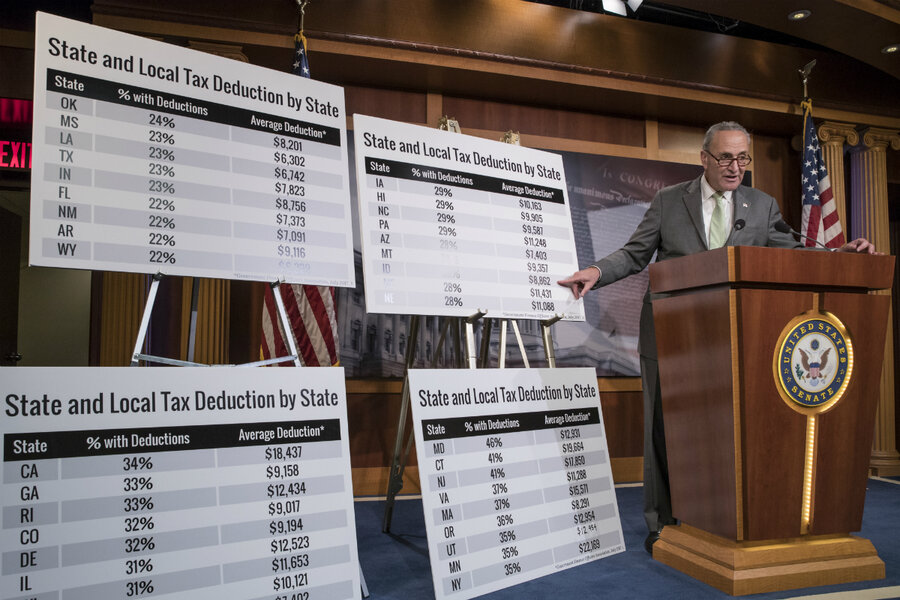Budget plan sets the stage for Republican tax reform
Loading...
| Washington
The House has passed a $4.1 trillion budget plan that promises deep cuts to social programs while paving the way for Republicans to rewrite the tax code later this year.
The 2018 House GOP budget reprises a controversial plan to turn Medicare into a voucher-like program for future retirees as well as the party's efforts to repeal the "Obamacare" health law. Republicans controlling Congress have no plans to actually implement those cuts while they pursue their tax overhaul.
That's especially so in the Senate, where the Budget Committee on Thursday gave party-line approval to a companion plan.
Instead, the nonbinding budget's chief purpose is to set the stage for a tax overhaul plan that is the party's top political priority as well as a longtime policy dream of key leaders like Speaker Paul Ryan.
The White House issued a statement saying the House plan is a key step toward "Making America Great Again."
The House measure, passed by a near party-line vote of 219 to 206, calls for more than $5 trillion in spending cuts over the coming decade, promising to slash Medicaid by about $1 trillion over the next 10 years, cutting other health care costs, and forcing huge cuts to domestic programs funded in future years by Congress.
"It's a budget that will help grow our economy, and it's a budget that will help rein in our debt," said Representative Ryan (R) of Wisconsin. "It reforms Medicaid. It strengthens Medicare."
But Republicans are not actually planning to impose any of those cuts with follow-up legislation that would be required under Washington's Byzantine budget rules. Instead, those GOP proposals for spending cuts are limited to nonbinding promises, and even a token 10-year, $200 billion spending cut package demanded by tea party House Republicans appears likely to be scrapped in upcoming talks with the Senate.
Instead, the motivating force behind the budget measures is the Republicans' party-defining drive to cut corporate and individual tax rates and rid the tax code of loopholes. They promise this tax "reform" measure will put the economy in overdrive, driving economic growth to the 3 percent range, and adding a surge of new tax revenues.
"In order to pay for these huge tax breaks for millionaires and billionaires, this Republican budget makes savage cuts to the life and death programs that mean so much to ordinary Americans," said Sen. Bernie Sanders (Ind.) of Vermont.
Passing the measure in the House and Senate would provide key procedural help for the tax measure because it sets the stage for follow-on legislation that can't be filibustered by Senate Democrats. Republicans used the same so-called reconciliation procedure in their failed attempt to kill "Obamacare," including its tax surcharges on wealthy people.
"Through reconciliation, our budget specifically paves the way for pro-growth tax reform that will reduce taxes for middle-class Americans and free up American businesses to grow and hire," said Rep. Diane Black (R) of Tennessee, who chairs the House Budget Committee.
Eighteen Republicans opposed the measure, including several from high-tax states like New York and New Jersey who are concerned that the upcoming tax effort would repeal the deductions for state and local taxes.
Democrats blasted the sweeping spending cuts proposed by Republicans – more than $5 trillion over 10 years in the House plan and somewhat less in the Senate GOP measure – as an assault on middle-class families and the poor.
"Is it a statement of our values to take a half-trillion dollars out of Medicare to give a tax cut to the wealthiest people in our country?" said House minority leader Nancy Pelosi.
The Senate Budget Committee's companion plan approved Thursday differs in key details – but would still result in a deficit of $424 billion in 2027, according to the Congressional Budget Office.
The House measure assumes the upcoming tax bill won't add to the deficit; the Senate version, however, would permit the measure to add $1.5 trillion to the $20 trillion-plus national debt over the coming 10 years. The final version is likely to stick closely to the Senate measure in key respects. A final House-Senate agreement won't come until November, Representative Black said, but she anticipated conflict over the Senate plans.
"That is certainly going to be a very lively discussion," Black said of House-Senate talks. "Our members are concerned about [budget] balance and they're also concerned about the debt and deficits."
The real-world trajectory of Washington, however, is for higher deficits as Republicans focus on tax cuts, a huge hike in the defense budget, and a growing disaster aid tally that is about to hit $45 billion.
"The train's left the station, and if you're a budget hawk, you were left at the station," said Rep. Mark Sanford, (R) of South Carolina.
This story was reported by The Associated Press.







